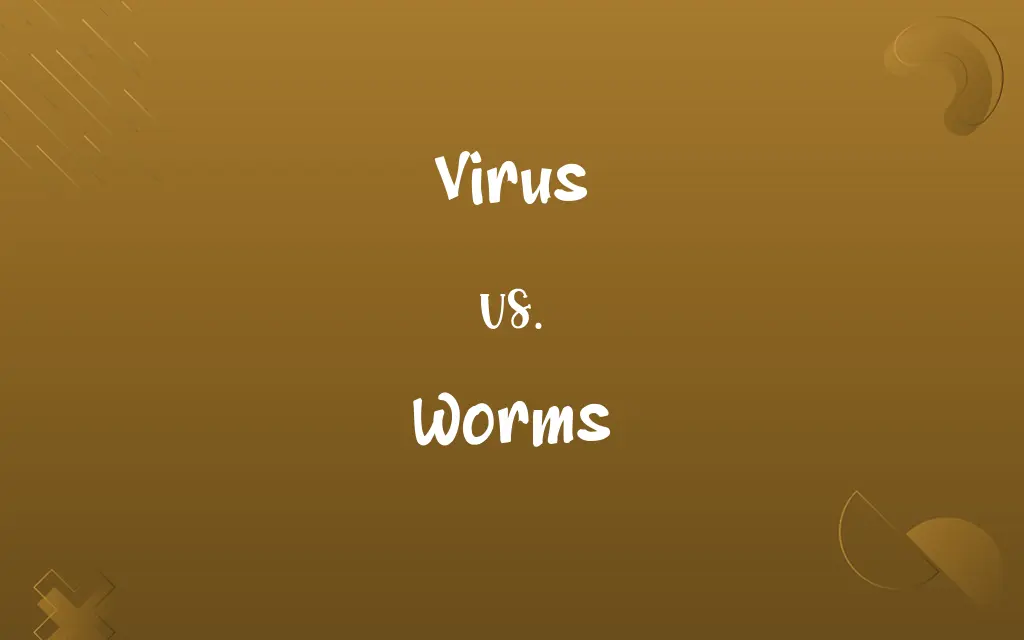Virus vs. Worms: Know the Difference

By Shumaila Saeed || Updated on December 25, 2023
A Virus is malicious software that requires user action to replicate, while a Worm is a self-replicating malware that spreads independently across networks.

Key Differences
A Virus is a type of malware that attaches itself to a program or file, requiring human action to spread, such as opening a file. Worms, in contrast, are self-contained programs that can self-replicate and spread without human intervention.
Shumaila Saeed
Nov 11, 2023
Viruses often corrupt or modify files on a targeted computer, leading to detrimental effects. Worms primarily focus on spreading across networks, consuming bandwidth and potentially delivering payloads like data theft.
Shumaila Saeed
Nov 11, 2023
The infection mechanism of a Virus typically involves modification of existing files, making them vectors for spreading the Virus. Worms do not need to attach themselves to programs; they are standalone software that exploits network vulnerabilities.
Shumaila Saeed
Nov 11, 2023
Viruses can be more challenging to detect due to their concealment within legitimate files. Worms, with their network activity, can be more easily detected but are harder to contain due to their rapid spread.
Shumaila Saeed
Nov 11, 2023
The primary intent of a Virus is often data damage or system disruption, whereas Worms may aim to create backdoors, allowing for further exploitation or additional malware delivery.
Shumaila Saeed
Nov 11, 2023
ADVERTISEMENT
Comparison Chart
Replication Method
Requires human action to spread
Self-replicating, spreads independently
Shumaila Saeed
Nov 11, 2023
Primary Effect
Corrupts/modifies files, system disruption
Consumes bandwidth, spreads payloads
Shumaila Saeed
Nov 11, 2023
Infection Mechanism
Attaches to and modifies existing files
Exploits network vulnerabilities, standalone
Shumaila Saeed
Nov 11, 2023
Detection
Harder to detect, concealed in files
Easier to detect due to network activity
Shumaila Saeed
Nov 11, 2023
Common Intent
Data damage, disruption
Creating backdoors, further exploitation
Shumaila Saeed
Nov 11, 2023
ADVERTISEMENT
Virus and Worms Definitions
Virus
Viruses can corrupt data and disrupt system functionality.
The Virus corrupted important system files, causing crashes.
Shumaila Saeed
Nov 10, 2023
Worms
A Worm is a standalone malware that replicates across networks.
The Worm quickly spread through the office network, affecting all computers.
Shumaila Saeed
Nov 10, 2023
Virus
A Virus is malware that attaches to other programs and replicates.
My computer got infected when I accidentally opened a file with a Virus.
Shumaila Saeed
Nov 10, 2023
Worms
It does not require a host file or program to propagate.
The Worm independently replicated itself without user interaction.
Shumaila Saeed
Nov 10, 2023
Virus
A Virus can be spread through email attachments or downloads.
She downloaded a game that unknowingly contained a Virus.
Shumaila Saeed
Nov 10, 2023
ADVERTISEMENT
Worms
Worms can install backdoors for further cyber attacks.
The Worm left a backdoor that was later used for a cyber attack.
Shumaila Saeed
Nov 10, 2023
Virus
Any of various submicroscopic agents that infect living organisms, often causing disease, and that consist of a single or double strand of RNA or DNA surrounded by a protein coat. Unable to replicate without a host cell, viruses are typically not considered living organisms.
Shumaila Saeed
Nov 09, 2023
Worms
Worms often exploit network vulnerabilities to spread.
A security loophole in the software allowed the Worm to spread.
Shumaila Saeed
Nov 10, 2023
Worms
They can consume bandwidth and slow down network performance.
The network became extremely slow due to the Worm's activity.
Shumaila Saeed
Nov 10, 2023
Virus
A computer program or series of commands that can replicate itself and that spreads by inserting copies of itself into other files or programs which users later transfer to other computers. Viruses usually have a harmful effect, as in erasing all the data on a disk.
Shumaila Saeed
Nov 09, 2023
Virus
A submicroscopic, non-cellular structure consisting of a core of DNA or RNA surrounded by a protein coat, that requires a living host cell to replicate, and often causes disease in the host organism; such agents are often classed as nonliving infectious particles and less often as microorganisms.
Shumaila Saeed
Nov 09, 2023
Virus
A disease caused by such an infectious agent; a viral illness.
He's got a virus and had to stay home from school.
Shumaila Saeed
Nov 09, 2023
Virus
(computing) A type of malware which can covertly transmit itself between computers via networks (especially the Internet) or removable storage such as disks, often causing damage to systems and data; also computer virus.
Shumaila Saeed
Nov 09, 2023
Virus
(figurative) Any malicious or dangerous entity that spreads from one place or person to another.
Shumaila Saeed
Nov 09, 2023
Virus
To send or infect an electronic device with a computer virus.
I'm just going to virus anyone who tries cheating on this game.
Shumaila Saeed
Nov 09, 2023
Virus
Contagious or poisonous matter, as of specific ulcers, the bite of snakes, etc.; - applied to organic poisons.
Shumaila Saeed
Nov 09, 2023
Virus
Any of numerous submicroscopic complex organic objects which have genetic material and may be considered as living organisms but have no proper cell membrane, and thus cannot by themselves perform metabolic processes, requiring entry into a host cell in order to multiply. The simplest viruses have no lipid envelope and may be considered as complex aggregates of molecules, sometimes only a nucleic acid (DNA or RNA) and a coat protein. They are sometimes viewed as being on the borderline between living and nonliving objects. They are smaller than living cells in size, usually between 20 and 300 nm; thus they pass through standard filters, and were previously referred to as filterable virus. The manifestations of disease caused by multiplication of viruses in cells may be due to destruction of the cells caused by subversion of the cellular metabolic processes by the virus, or by synthesis of a virus-specific toxin. Viruses may infect animals, plants, or microorganisms; those infecting bacteria are also called bacteriophages. Certain bacteriophages may be non-destructive and benign in the host; - see bacteriophage.
Shumaila Saeed
Nov 09, 2023
Virus
Fig.: Any morbid corrupting quality in intellectual or moral conditions; something that poisons the mind or the soul; as, the virus of obscene books.
Shumaila Saeed
Nov 09, 2023
Virus
A program or segment of program code that may make copies of itself (replicate), attach itself to other programs, and perform unwanted actions within a computer; also called computer virus or virus program. Such programs are almost always introduced into a computer without the knowledge or assent of its owner, and are often malicious, causing destructive actions such as erasing data on disk, but sometime only annoying, causing peculiar objects to appear on the display. The form of sociopathic mental disease that causes a programmer to write such a program has not yet been given a name. Compare trojan horse{3}.
Shumaila Saeed
Nov 09, 2023
Virus
(virology) ultramicroscopic infectious agent that replicates itself only within cells of living hosts; many are pathogenic; a piece of nucleic acid (DNA or RNA) wrapped in a thin coat of protein
Shumaila Saeed
Nov 09, 2023
Virus
A harmful or corrupting agency;
Bigotry is a virus that must not be allowed to spread
The virus of jealousy is latent in everyone
Shumaila Saeed
Nov 09, 2023
Virus
A software program capable of reproducing itself and usually capable of causing great harm to files or other programs on the same computer;
A true virus cannot spread to another computer without human assistance
Shumaila Saeed
Nov 09, 2023
Virus
It requires a host program to activate and spread.
The Virus spread to other files only after the host application was run.
Shumaila Saeed
Nov 10, 2023
Virus
Antivirus software is essential to detect and remove Viruses.
My antivirus software detected a Virus in a downloaded file.
Shumaila Saeed
Nov 10, 2023
Repeatedly Asked Queries
What damage can a Virus cause?
Data corruption, system crashes, and performance issues.
Shumaila Saeed
Nov 11, 2023
Do Viruses need a host file?
Yes, they require a host file or program to replicate.
Shumaila Saeed
Nov 11, 2023
What's the main goal of a Worm?
To spread as widely as possible, sometimes delivering other malware.
Shumaila Saeed
Nov 11, 2023
Are Worms detectable by standard antivirus programs?
Yes, but their rapid spread can make containment challenging.
Shumaila Saeed
Nov 11, 2023
Can Worms spread without any human action?
Yes, they can self-replicate and spread automatically.
Shumaila Saeed
Nov 11, 2023
How does a Virus spread?
Through human actions like opening files or running programs.
Shumaila Saeed
Nov 11, 2023
Can a Virus be manually removed?
It's possible, but using antivirus software is more effective.
Shumaila Saeed
Nov 11, 2023
Can Worms be used for espionage?
Yes, especially if they install backdoors or steal data.
Shumaila Saeed
Nov 11, 2023
What's a common way to contract a Worm?
Through vulnerable network services or software.
Shumaila Saeed
Nov 11, 2023
Can a Virus spread over a network?
Yes, if it infects files shared across the network.
Shumaila Saeed
Nov 11, 2023
Can a Virus be spread through email?
Yes, particularly through infected attachments.
Shumaila Saeed
Nov 11, 2023
How can I protect against Worms?
Use robust antivirus software and keep systems updated.
Shumaila Saeed
Nov 11, 2023
Is it safe to open an email from an unknown sender?
It's risky, especially if it contains attachments or links.
Shumaila Saeed
Nov 11, 2023
Are Worms faster in spreading than Viruses?
Generally, yes, due to their autonomous replication.
Shumaila Saeed
Nov 11, 2023
Can Worms be spread via USB drives?
Yes, if they are programmed to replicate through such media.
Shumaila Saeed
Nov 11, 2023
Do Worms always damage data?
Not always, but they can disrupt networks and systems.
Shumaila Saeed
Nov 11, 2023
Can a Worm spread globally?
Yes, some Worms have spread worldwide, affecting millions of systems.
Shumaila Saeed
Nov 11, 2023
What is the first sign of a Virus infection?
Unusual system behavior, crashes, or slow performance.
Shumaila Saeed
Nov 11, 2023
Are mobile devices susceptible to Viruses?
Yes, though the type and impact may differ from PCs.
Shumaila Saeed
Nov 11, 2023
Do Viruses affect Macs and PCs differently?
Yes, depending on the OS, the impact and spread can vary.
Shumaila Saeed
Nov 11, 2023
Share this page
Link for your blog / website
HTML
Link to share via messenger
About Author
Written by
Shumaila SaeedShumaila Saeed, an expert content creator with 6 years of experience, specializes in distilling complex topics into easily digestible comparisons, shining a light on the nuances that both inform and educate readers with clarity and accuracy.









































































